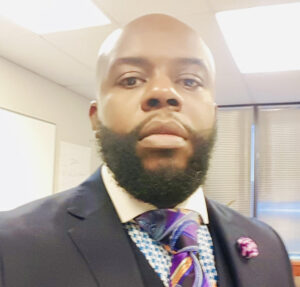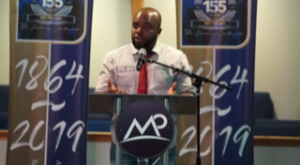Student Spotlight
Dre Traybore
Dre is working on his Master of Divinity through the Graduate School of Theology’s online program and he is an Associate Minister at Mt. Pisgah MBC. Recently, he has been involved in pulling together ecumenical efforts in Dallas to address racial injustice. We asked if he’d be willing to talk to us a bit about that project, and he was kind enough to give us this response. Enjoy!
Even as I sit to pen this response in regards to working within the community with other ministers to combat systemic racism and social injustice, it is 11:24 p.m. and I see on CNN where yet another black man has been brutally and viciously shot at the hands of a police officer in Kenosha, Wisconsin. It was a somewhat similar incident in Minneapolis, Minnesota that caused the world to pause. During this pause, I reached out to Dr. Tim Sensing via email to see what ACU’s response to the uprising of protests and riots across America was. It was this email that started a conversation that led to me hosting a Zoom meeting. On this call were Black Pastors from the DFW area and several administrators at ACU. The conversation is the project. The project is bringing the church to the front to lead the conversation. Through this Zoom call, we learned about Professor Werntz and the Baptist Studies Center at ACU, and their consulting of some black pastors in the area. We were able to connect with a group of ministers in the Dallas/Fort Worth area who speak out against racial and social injustice. We were also able to have the discussion about putting doctrinal differences aside to be the voice the world needs to hear during this time.

Through these conversations we determined that my mentor (my pastor) and I would continue to work to bring this group to the table. We are holding another Zoom in the near future to discuss next steps in regards to how we can come together. We are in the midst of planning initiatives like a pulpit swap, unity table, and other events to have hard conversations with Christian leaders from several denominations. The response has been overwhelmingly positive, and many are willing to participate in any way possible. All of the ACU staff and administration that were a part of the call continue to offer their support.
As I reflect on the role of the minister I am reminded by Eric Mason in his book, Woke Church, that we must be aware, be accountable, and be active when it comes to racial reconciliation and justice. Ministers have to reclaim our prophetic voice in the vision for change. Reclaiming our voice will put the church at the front of these issues and not behind.[1] Too often, the response by ministers is delayed and behind. The news outlets tend to control the narrative and we seem to be the last to speak, instead ministers have to be the first. Secondly, the church has to acknowledge the role that it has played in the demise of black lives.
The most important is the church being in front of it and not behind. Jesus never feared addressing issues directly, the church shouldn’t either. It is imperative that ministers, pastors, theologians, and servant leaders be the first interviews on CNN, MSNBC, FOX News, and other mass media. The leading voice must be the voice of the church collective. We have to use the platforms available to us so that we are in front. Our platform is huge as we have social media, live streams, YouTube, and other outlets. We cannot be last to respond; we must be first.
This has to be led by ministers that are willing to stand for the doctrine of justice. Practical moves must be informed by our theology. In other words, our role must be first theological and then pragmatic. This work starts in the church, and spreads to the wider world.
 As Christians God, Christ and the cross are central to our engagement with society. In Matthew 22:36, when asked what the greatest commandment is, Jesus’ response was to love God with all your heart, all your soul, and all your mind. Secondly, love your neighbor as you love yourself. For this reason, the church should be ever engaging. This is the church’s responsibility in loving our neighbors. The church needs to engage, not only because it is our call to love our neighbor, also because it was the example of our great teacher when he was ridiculed for eating with sinners, or staying with the marginalized. Jesus set the ultimate example in John 8, when he said these words, “Let him who is without sin cast the first stone.” I find this statement interesting as He was the only one without sin in the group, yet his counterpart’s response was to turn and walk away. Here, in America, they say justice is blind, but we see here Jesus administer justice in a practical and pragmatic way. The African Americans’ plight has been this: justice is neither practical or pragmatic for us. This is our reality. So long as justice remains a theoretical discussion, we (the church) will not be living the life our savior embodied.
As Christians God, Christ and the cross are central to our engagement with society. In Matthew 22:36, when asked what the greatest commandment is, Jesus’ response was to love God with all your heart, all your soul, and all your mind. Secondly, love your neighbor as you love yourself. For this reason, the church should be ever engaging. This is the church’s responsibility in loving our neighbors. The church needs to engage, not only because it is our call to love our neighbor, also because it was the example of our great teacher when he was ridiculed for eating with sinners, or staying with the marginalized. Jesus set the ultimate example in John 8, when he said these words, “Let him who is without sin cast the first stone.” I find this statement interesting as He was the only one without sin in the group, yet his counterpart’s response was to turn and walk away. Here, in America, they say justice is blind, but we see here Jesus administer justice in a practical and pragmatic way. The African Americans’ plight has been this: justice is neither practical or pragmatic for us. This is our reality. So long as justice remains a theoretical discussion, we (the church) will not be living the life our savior embodied.
I’m most excited that different persons from different backgrounds can come together and have hard, but much needed conversations. Doctrinal differences are being placed to the side to be the disciples Jesus called us to be (Matthew 28:20). My hope is for a future where the conversation with teenage children is the same for both black and white parents. Where, I don’t have to remind my teenage daughter to show the police her hands, or using the words “remember you are black” when my son is leaving my presence. My hope is for a church that doesn’t ignore injustice but speaks justice according to God’s word. A church that boldly proclaims the gospel and seeks to be peacemakers.
But, our next steps have to move beyond conversation. The conversation is critical to the success of the church leading the way but, moving beyond dialogue is the next step. I believe it is not upon one person’s shoulders to determine the next steps, it has to be a collective effort of willing hearts to move things forward. This conversation starts within the confines of our own concentric circles and must extend to what we are preaching and teaching within our families, communities, and churches. I believe, at this point, just being aware is being behind. I believe it is time for live conversations and actions. It is not enough to be aware of what is going on. Efforts like unity gatherings, pulpit swaps, community outreach together have to be constant, not just during times such as this. The church has to “do” life together. Jesus and his disciples were together for nearly 3 years every day. They lived together, ate together, worshiped together, prayed together, they literally did life together. This is the call to action right now, for the church to do life together so that the world can be witness to life without racial, socioeconomic, and educational barriers. We have to be willing to sit with one another and have hard, but necessary, conversations. This is essential for healing to take place among the church and among communities all over this country.
[1] Eric Mason. Woke Church: An urgent call for Christians in America to confront racism and injustice. Chicago, Moody Publishers. 2018. P. 115-140.
